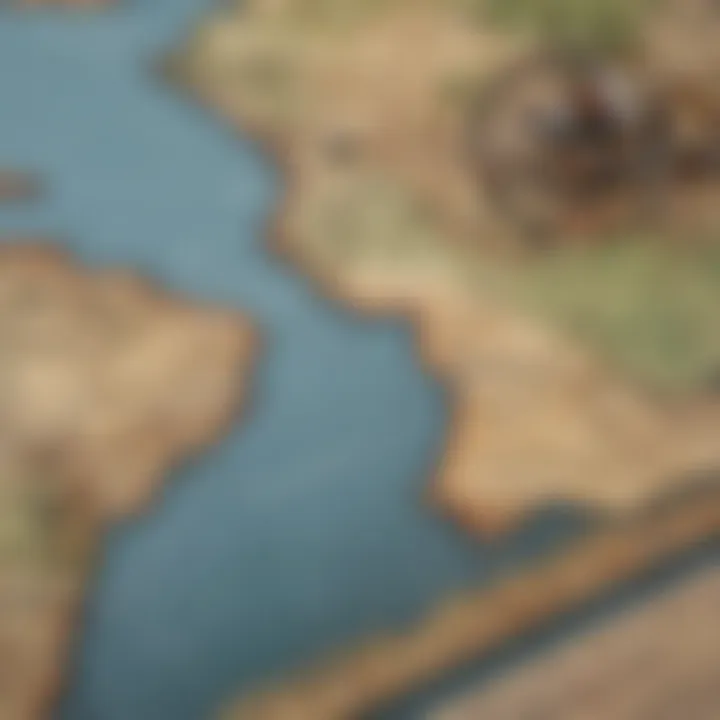Essential Books to Explore World History


Intro
When we think about world history, we often picture a vast expanse of time filled with events, personalities, and civilizations that shape our existence today. The intricate weaving of these narratives reflects not just culture, wars, and politics, but also art, philosophy, and human experience. Pouring over the pages of historical texts builds a bridge between us and our past, allowing us to glean lessons and insights that remain relevant.
In this exploration, we will sift through a collection of essential books on world history that offers rich perspectives and varied methodologies, giving readers not just a glimpse but a deep dive into the story of humanity. Each selection aims to inspire critical thinking and an appreciation for the complexities of the world we inhabit.
Book Categories
To better understand the multifaceted nature of world history through literature, it's useful to categorize these essential texts. This organization allows for a more structured exploration of the subject, ensuring that readers can find materials suited to their interests and intellectual pursuits.
Fiction and Literature
Many may not associate fiction with history, yet narratives spun from the loom of imagination can unveil truths about human behavior and societal norms across different eras. Novels set in historical contexts often breathe life into past events, making them relatable. They illuminate the emotional and social layers underlying historical facts. Notable examples include:
- "The Book Thief" by Markus Zusak
- "War and Peace" by Leo Tolstoy
Fiction offers a distinct lens that can make history more accessible. These works compel readers to step into the shoes of characters who lived through key historical moments, often invoking empathy and deeper understanding.
Self-Help and Personal Development
Though not directly related to historical events, this category can provide insight into how history shapes human behavior, leadership, and societal change. Books such as "Sapiens: A Brief History of Humankind" by Yuval Noah Harari dissect the evolution of humankind and prompt readers to ponder their roles in the larger timeline of existence.
Additionally, texts addressing historical perspectives on personal growth encourage introspection. They reveal how the lessons of the past can guide individual and collective futures.
Book Summaries
Now that we've categorized the books, it's time to summarize and highlight key takeaways that emerge from these narratives. Each book offers a unique perspective, and understanding their insights can enrich readers’ historical knowledge.
Key Insights and Takeaways
Readers can distill numerous insights from our curated selection:
- Understanding the motivations behind significant historical events helps demystify the complexity of human nature.
- Themes of resilience and struggle recur throughout history, offering templates for overcoming contemporary challenges.
- Fictional narratives allow for emotional engagement with historical themes, making them impactful.
"History is not just what happened; it's how it happened and who it happened to."
How to Apply the Lessons
To apply the lessons learned from these texts, consider the following approaches:
- Reflect on the themes presented in both fictional and non-fictional works and their relevance today.
- Engage in discussions that challenge the narratives offered in these books, honing critical thinking skills.
- Use historical insights to inform your own life decisions, encouraging a deeper understanding of personal and societal dynamics.
In these ways, the art of learning from history can transcend mere academic interest; it becomes a tool for personal and communal growth, firmly rooting us in the present while shaping our perceptions of the future.
Prologue to World History Literature
When one delves into world history literature, it's akin to opening a time capsule, packed with tales that shaped our present and, ultimately, our future. This section focuses on the importance of understanding historical literature in broadening our understanding of not just dates and events, but the intricate interactions, motivations, and consequences that have colored the human experience across the ages.
The Importance of Historical Context
To grasp the weight of particular historical events, one must appreciate the surrounding context. Just like a good recipe requires quality ingredients, a historian’s narrative benefits from rich context. For instance, the rise of the Roman Empire cannot be fully understood without considering the cultural interactions it fostered with surrounding nations.


"History isn’t just about battles and treaties; it’s about people, their aspirations, and their everyday lives."
When we recognize that every event is influenced by social, economic, and political factors, we start to see it’s a complex web. This understanding invites readers to analyze, question, and connect seemingly unrelated historical moments. Each layer of context reveals more about the societal norms and values of a given era, thereby presenting history as more than a mere sequence of events.
How Literature Influences Historical Understanding
The literature of history plays a crucial role in shaping our perceptions and interpretations of events. Books provide not just the facts, but also the insight to interpret those facts within their specific milieu. Through storytelling, authors breathe life into events, creating a visceral experience for their readers. An excellent historical narrative captures its audience, allowing them to step into the shoes of individuals who lived through complex times.
For example, works like "A People's History of the United States" by Howard Zinn provide a counter-narrative to conventional historical accounts, emphasizing the struggles of marginalized groups. This angle encourages readers to think critically about who gets represented in the chronicles of history, challenging them to acknowledge varied perspectives.
Literature serves as a mirror, reflecting the concerns and values of the time it was written, which can often illuminate the biases inherent in historical narratives. When readers engage with these texts, they are not just absorbing information; they are developing a nuanced understanding of how history is recorded and contested.
In sum, literature is not an ancillary component of historical study. Instead, it is an essential tool that enhances our comprehension of the past, ultimately enabling a more informed perspective on the modern world. It equips readers with the critical thinking skills necessary to navigate the diverse narratives that shape our understanding of human history.
Key Themes in World History
Examining the Key Themes in World History gives readers insight into the significant narratives that shape our understanding of the past. These themes not only underscore the complexities of historical events but also connect disparate times and places through shared experiences. Readers benefit from exploring these connections as they enrich one’s perspective on current global dynamics. By framing world history through this thematic lens, literature urges us to confront uncomfortable truths and engage with historical narratives that resonate even today.
Colonialism and Its Legacies
Colonialism left profound marks on the world. Analyzing this theme uncovers a tangled web of exploitation, resistance, and cultural imposition. The repercussions extend far into the present; territories marked by colonial rule often grapple with economic, social, and political challenges rooted in those historical contexts. Works like "Orientalism" by Edward Said dissect these legacies, offering critical insights into how power dynamics shape cultural narratives. This theme exemplifies how deep historical scars impact identities and relationships between nations and peoples.
Revolutions: A Catalyst for Change
Revolutions frequently act as the tipping point for change throughout history. Examining this theme highlights how individuals and groups rise in collective consciousness against oppression. For example, "The Anatomy of Revolution" by Crane Brinton outlines the phases of revolutions, making it clear that change often involves tumult and sacrifice. It’s through the lens of revolutions that readers can appreciate the persistent human desire for freedom and justice, linking past uprisings to contemporary movements for social change across the globe.
War and Peace: The Human Condition
The dichotomy between war and peace fundamentally reflects the human experience. Delving into this theme reveals the motivations behind warfare, from territorial disputes to ideological battles. The works of authors like "On War" by Carl von Clausewitz and "The Art of War" by Sun Tzu provide philosophical frameworks through which to understand the nature and consequences of warfare. Meanwhile, contrasting those narratives with peace-building literature helps paint a complete picture of human conflict and resolution, showing that peace is often hard-won and requires tireless effort.
Cultural Exchanges and Their Impact
Human history has been shaped by cultural exchanges, whether through trade, migration, or conquest. This theme sheds light on how these interactions lead to the diffusion of ideas, technologies, and practices. The book "The Silk Roads: A New History of the World" by Peter Frankopan draws connections between East and West, showcasing how these encounters are pivotal in the course of world history. Such exchanges reveal the interconnectedness of societies, making the case for a more global understanding of cultural heritage—emphasizing that no culture exists in isolation, and understanding these interactions enriches our grasp of the human experience.
Understanding themes such as colonialism, revolutions, war, and cultural exchanges is crucial as it helps frame historical contexts that still influence global relationships today.
Fundamental Works of World History
World history, with its sprawling narratives and multifaceted perspectives, calls for foundational texts that illuminate the significant events, people, and cultures that shape our world. These fundamental works serve as essential guides—much like a compass for a lost traveler in a foreign land—bridging the gaps in our understanding and offering context to historical happenings. Neglecting these crucial texts would be akin to attempting to piece together an intricate jigsaw puzzle without the box cover to show the final picture.
Engaging with these works not only broadens one’s historical knowledge but also cultivates critical thinking and a deeper appreciation for diverse viewpoints. From colonial legacies to global exchanges, understanding these texts lays a robust groundwork for grappling with humanity's complexities. Through these narratives, readers can appreciate how the events of the past echo into contemporary society, giving rise to forms of governance, cultural practices, and issues we witness today.
A People's History of the United States
Howard Zinn’s "A People’s History of the United States" stands as a transformative approach to understanding American history. Zinn casts history through the lens of the marginalized, voicing the perspectives often overlooked in mainstream narratives. This work digs into the lives of the disenfranchised—indigenous peoples, women, and laborers—documenting their struggles and contributions. Rather than a traditional hero's journey, Zinn highlights the collective fight for social justice and equity. By positioning the common people at the forefront, Zinn encourages readers to reflect on the power dynamics of historical narratives and to question who gets to tell the story.
Guns, Germs, and Steel
Jared Diamond's "Guns, Germs, and Steel" offers a sweeping analysis of human history through the prism of geography and environment. Diamond links the fates of societies to the geographical and biological advantages that some civilizations had over others. This work is particularly valuable because it challenges the notion of racial or ethnic superiority, positing instead that access to resources played a pivotal role in the fate of nations. By unpacking the reasons behind European dominance in the world, Diamond provides crucial insights into the intricate tapestry of human development and its often uneven progress.
Sapiens: A Brief History of Humankind


In his masterpiece, "Sapiens: A Brief History of Humankind," Yuval Noah Harari takes a bold step back, viewing history from the emergence of homo sapiens to the complexities of modern society. Harari does not shy away from the uncomfortable truths of our past, examining how shared myths, cultures, and economic systems have shaped humanity. This work goes beyond mere chronology; it invites readers to contemplate big questions of existence, progress, and responsibility. The lively prose combined with compelling ideas makes this book not just an informative read but a philosophical exploration of what it means to be human.
The History of the Ancient World
Susan Wise Bauer's "The History of the Ancient World" presents an engaging retelling of history from the earliest documented societies to the emergence of the Roman Empire. Bauer adopts a narrative style that breathes life into historical figures, making ancient history accessible and relatable. This book serves as a unique entry point for those who seek to appreciate the interconnectedness of civilizations and the evolution of human societies over time. It illustrates that the patterns of history often repeat themselves, revealing timeless lessons that still resonate today.
The Silk Roads: A New History of the World
Peter Frankopan’s "The Silk Roads: A New History of the World" redefines the conventional Eurocentric view of global history by focusing on the trade routes that connected East and West. Frankopan artfully illustrates how these connections facilitated not just commerce but also the exchange of ideas, cultures, and technologies. This text is instrumental in expanding the reader's perspective on the influences and interdependencies among different civilizations throughout history. By spotlighting the Silk Roads, Frankopan encourages an appreciation of the complex interplay that has shaped global relations over centuries.
Critical Perspectives in Historical Writing
Critical perspectives in historical writing are like a key that opens up new rooms in a vast mansion of history. They allow us to see the past through different lenses, revealing nuances that might be overlooked. By examining these perspectives, we gain a more rounded view of historical events and narratives. This section of the article aims to shine a light on three notable critical lenses: postcolonial critique, feminist histories, and environmental history. These frameworks not only enrich our understanding but also challenge dominant historical narratives, helping us to appreciate the complexities of human experiences.
Postcolonial Critique
Postcolonial critique examines the impact of colonialism on cultures and societies. It questions how history is written and who gets to tell it. This perspective is vital for understanding the legacies of colonial powers and how they shaped modern societies. For instance, one might delve into works like Edward Said's Orientalism, which critiques Western portrayals of the East. Here, the West is positioned as the narrator, often creating a biased view of the East as exotic or primitive. This critique leads us to consider voices that have been marginalized throughout history, promoting a broader and more inclusive understanding of world history. By recognizing these overlooked narratives, readers can confront the uncomfortable truths about power dynamics and cultural representation.
Feminist Histories
Feminist histories carve out space for women's voices and experiences that have been sidelined in traditional historical narratives. They challenge the notion that history is solely a male chronicle, opening up discussion about gender dynamics and societal roles. Examining key texts such as Gerda Lerner's The Creation of Feminist Consciousness illustrates how women's histories are intricately linked with broader socio-political contexts. This perspective allows readers to understand how women's contributions have shaped history, albeit often invisibly. In looking at history through a feminist lens, one uncovers stories of resistance and resilience, broadening the canvas of human experience.
Environmental History
Environmental history is an emerging field that focuses on the relationship between people and the natural world over time. It encourages us to rethink our understanding of history by placing ecological factors at the forefront. Changes in the Land by William Cronon is a legendary work in this regard, illustrating how human activities transform environments. This perspective urges us to consider how historical events are often influenced by environmental changes, such as climate shifts or epidemic diseases. By analyzing historical events through this lens, readers can better appreciate the interconnectedness of human societies and their environments.
"The past is never dead. It's not even past." — William Faulkner
Modern Interpretations of Historical Events
In the realm of historical literature, understanding modern interpretations of historical events is crucial. These interpretations challenge how past occurrences are viewed, and they provide deeper insights into their implications for today’s society. This section will explore several pivotal areas of contemporary thought around notable events, aiming to underscore their significance in understanding our present.
The Holocaust and Memory
The Holocaust remains one of the most harrowing chapters in human history. It serves not only as a subject of historical study but also as a lens through which we can comprehend collective memory and trauma. Numerous works examine this period, including memoirs, historical analyses, and academic texts.
One significant aspect to consider is the way narratives of the Holocaust shape cultural memory. Books like Night by Elie Wiesel offer personal accounts that encapsulate the horror of this genocide while urging the importance of remembrance. Not merely a retelling, these texts force readers to confront the reality of the atrocities committed, challenging them to reflect on moral responsibility.
Moreover, contemporary analysis focuses on how the memory of the Holocaust is often utilized in discussions about human rights and social justice today. It provides a counterpoint to notions of othering and fosters a dialogue about empathy, ethics, and the necessity of safeguarding against future atrocities.
"Those who cannot remember the past are condemned to repeat it."
— George Santayana
Colonial History in Contemporary Perspectives
Colonial history shapes much of today’s geopolitical landscape, and modern literature on this topic illustrates its continued relevance. Contemporary perspectives focus on the profound legacies of colonialism, addressing issues of race, identity, and power structures that persist even in postcolonial societies.
Works such as The Wretched of the Earth by Frantz Fanon and Orientalism by Edward Said present critical lenses through which to analyze the impact of colonial mindset on both colonized and colonizers. These texts encourage readers to question prevailing narratives and understand how colonial history informs issues like globalization and migration today.
By examining history through a postcolonial lens, readers gain insights into the complexities of cultural identity that arise from centuries of oppression and resistance. The relevance of colonial history in contemporary perspectives cannot be overstated, as it remains a central thread in the fabric of global relations.
Globalization: Historical Context


As we grapple with the implications of globalization in a rapidly changing world, a historical context becomes essential. Examining how globalization has evolved sheds light on its current effects on cultures and economies worldwide.
Books like Globalization and Its Discontent by Joseph Stiglitz illuminate the economic aspects, detailing how globalization can simultaneously enhance and undermine local economies. Such discussions reveal contradictions inherent in a globalized world, where benefits are unequally distributed.
Additionally, exploring the social dimensions of globalization helps readers understand the cross-cultural exchanges that redefine societies. This historical context emphasizes the importance of analyzing both the positive and negative outcomes of globalization. It serves as a reminder that looking back at historical movements is key to addressing ongoing complexities in international relations and cultural identity.
In summary, modern interpretations of historical events are vital for grasping how history shapes contemporary society. By reflecting on the Holocaust’s memory, colonial histories, and the implications of globalization, we enrich our understanding and foster a more profound appreciation of the narratives that define human experience.
Research and Resources
In the vast field of world history, access to reliable and comprehensive resources is essential for understanding the myriad narratives that shape our past. This segment aims to underscore the significance of research tools and materials available to historians, students, or anyone keen in digging deeper into history's many facets. Well-planned research can illuminate intricate details and provide not just facts but also encourage critical thinking about historical context and relevance. By delving into specialized content, readers can clarify their thoughts and unearth fresh insights into familiar subjects.
Utilizing Online Archives
In this digital age, online archives have risen to become invaluable tools for historical research. These repositories house a treasure trove of primary and secondary sources that can catalyze a change in understanding historical events. Accessing materials ranging from letters, photographs, and newspaper clippings to government documents can spark new ideas and perspectives. For example, the National Archives offers extensive materials that provide a window into various historical timelines.
Working through online archives encourages a sense of discovery. Historians can follow threads of clues in letters or unearth unique stories obscured by time. Additionally, the convenience of digital platforms allows easy access to these resources from remote locations. Keep in mind, however, that while the internet holds a wealth of information, verifying the authenticity and credibility of the sources remains paramount.
Academic Journals on History
Staying abreast of scholarly discussions is crucial for anyone interested in world history. Academic journals such as "The Journal of World History" and "History Compass" provide peer-reviewed articles that go beyond surface-level historical narratives. Reading these journals not only enriches one’s understanding of specific topics but also introduces readers to emerging debates and methodologies in the field.
Engaging with academic literature allows you to confront interpretations from various historians and encourages critical analysis. Readers gain access to both data and argumentation that shape our understanding of past events. Moreover, academic journals frequently include book reviews and notations about trending themes, which can serve as a jumping-off point for further research.
Documentaries as Historical Sources
Documentaries present another avenue for investigating the past while catering to different learning styles. These visual narratives weave together historical data, expert commentary, and storytelling to create an engaging learning experience. Films like "The World at War" or "The Untold History of the United States" synthesize complex events into digestible formats, allowing viewers to grasp significant themes more easily.
However, it's essential to approach documentaries with a critical eye. While they can simplify complex subjects, they also risk oversimplification. Differentiating between entertainment and educational content is key. Hence, supplementary reading from books or academic articles on the same subjects can provide a more rounded perspective.
Documentaries combine the allure of storytelling with factual content, yet critical evaluation ensures an informed understanding.
The End: The Enduring Value of Historical Literature
Understanding history is akin to holding a mirror to humanity, revealing both our triumphs and our blunders. As we wrap up our exploration of pivotal books in world history, it's vital to underscore the enduring value of historical literature. Not simply a collection of dates and events, historical books act as windows into societies far removed from our own, offering a tapestry of human experience woven through time that helps us comprehend who we are today.
Among the myriad benefits of studying historical literature is the unique perspective it furnishes. When a reader delves into a well-crafted narrative, they often find themselves grappling with the same moral and ethical dilemmas faced by people in different epochs. This connection to the past fosters empathy and a deeper understanding of the present world. As we learn from the past, we gather insights that inform our future behavior, thinking, and policies. The interplay of individual stories within these texts illuminates larger themes—colonialism, war, cultural exchange—that continue to resonate.
In an era marked by rapid change and uncertainty, historical literature not only educates but also offers a compass for navigating contemporary challenges. To engage with history is to embrace the complexity of human existence. It reminds us that while the world is ever-evolving, the underlying human motivations and experiences are somewhat constant. This continuity allows us to recognize patterns, reflect critically on our society’s actions, and question the narratives presented to us.
History as a Tool for Understanding Humanity
History serves as more than just a record of events; it is a crucial tool for discerning patterns in human behavior. By studying various narratives, we come to realize that many issues we grapple with today—inequality, conflict, societal division—are not new. The stories found in historical literature enable us to draw parallels between different contexts and see that the struggles of one era can echo into the present.
For instance, consider the books that document revolutions throughout time. They often reveal the socio-political pressures that lead masses to seek change. The emotional undertones present in these narratives remind us that, fundamentally, these are stories about individuals striving for their rights, dignity, and freedom. When we grasp this human connection, history becomes less intimidating; it transforms into a story of resilience and adaptation—a story that is still being penned today.
The value of historical literature reaches beyond mere academic interest. It shapes our identity and informs our worldview. For students and educators alike, these texts become vital tools in fostering critical thinking skills, encouraging readers to question established narratives and consider diverse perspectives. One might view historical literature as a bridge, connecting various cultures and epochs, allowing us to learn from one another and understand the globalized world we inhabit.
Promoting Historical Literacy
The quest to promote historical literacy is not just an academic endeavor, but rather a societal necessity. In a world clamoring for facts, discernment is our best friend. As misinformation spreads like wildfire, the ability to critically engage with historical texts becomes vital. Historical literacy empowers individuals to sift through the noise, helping them to construct their own informed opinions based on evidence rather than rhetoric.
To foster this skill, educators must champion the role of historical literature in classrooms. Encouraging students to engage with primary sources, narratives, and even contrasting interpretations can foster a rich environment of discussion and inquiry. This practice not only enhances comprehension but also cultivates a habit of lifelong learning about history.
As we stand at the crossroads of past and future, historical literature beckons us to listen closely to the voices echoing through time. The power of the written word in shaping our understanding of humanity is immense. It holds the key to not only recognizing our roots but also navigating the sieve of modern life with wisdom.
Closing Thoughts
In essence, the enduring value of historical literature lies in its expansive reach—how it connects, challenges, and inspires. If we embrace this literature not merely as facts but as narratives rich with emotion and ethics, we not only honor the past but also forge a path toward a more informed and compassionate future. In the grand narrative of human history, literature remains a vital thread that continues to enrich our understanding of ourselves and the world around us.



